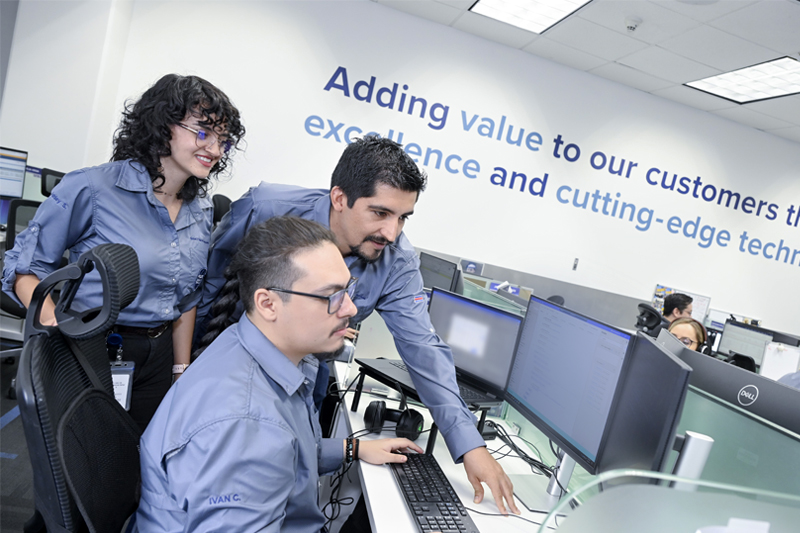Companies at Coyol Free Zone are at the forefront of adopting digital health technologies
The Medical Devices industry is undergoing rapid evolution, driven by technological advancements, regulatory changes, and shifting market demands.
Companies within this sector are leveraging these trends to enhance their products, streamline operations, and improve patient outcomes.
Leading firms at Coyol Free Zone are currently adopting these trends to remain competitive.
Understanding current trends in the Medical Devices Industry
- Digital Health and Connectivity: The integration of digital health technologies is revolutionizing the Medical Devices industry. Connected devices that collect and transmit data in real-time are enhancing patient monitoring and care. This trend includes wearable devices, remote monitoring systems, and telemedicine solutions, which offer improved patient engagement and better management of chronic conditions.
- Artificial Intelligence (AI) and Machine Learning (ML): AI and ML are transforming how Medical Devices operate. These technologies are being used for predictive analytics, personalized medicine, and improving diagnostic accuracy. AI-driven devices can analyze large datasets to identify patterns and make real-time decisions, leading to faster and more accurate diagnoses.
- Minimally Invasive Procedures: There is a growing demand for minimally invasive surgical devices and techniques that reduce patient recovery times and improve outcomes. Innovations such as robotic-assisted surgeries and advanced imaging technologies are enhancing the precision and effectiveness of minimally invasive procedures.
- Personalized Medicine: The shift towards personalized medicine is driving the development of devices tailored to the individual needs of patients, including devices that support personalized drug delivery and customized treatment plans based on genetic profiles.
- Regulatory and Compliance Trends: Increasing regulatory requirements and the need for compliance with global standards are impacting how Medical Devices are developed and brought to market. Companies must navigate regulatory landscapes to ensure their products meet safety and efficacy standards.
How companies in Coyol Free Zone are embracing MedTech trends
Digital Health and Connectivity
Companies at Coyol Free Zone are at the forefront of adopting digital health technologies. For instance, Hologic has enhanced its capabilities by opening a pioneering cybersecurity operations center in Costa Rica. This facility not only supports digital health initiatives but also ensures the security and integrity of connected medical devices.
By integrating cybersecurity with digital health solutions, Hologic is addressing the growing need for secure, connected medical devices that can provide real-time data and support remote patient monitoring.

Artificial Intelligence and Machine Learning
AI and ML are pivotal in the innovations pursued by companies within Coyol Free Zone. Establishment Labs is leveraging AI to enhance their product development processes. By incorporating AI algorithms, the company can analyze extensive clinical data to optimize the design and functionality of their medical devices.
Teradyne, a cutting-edge company located in our industrial park, is at the forefront of providing AI solutions to device manufacturers. Through its advanced test solutions, it is engaged in driving AI innovation, enabling leading innovators to swiftly introduce new AI devices, optimize yield, and enhance silicon performance.
This integration of AI allows for the creation of more sophisticated and effective devices, leading to improved patient outcomes and more efficient manufacturing processes.
Minimally Invasive Procedures
Smith & Nephew stands out in advancing minimally invasive procedures. The company has expanded its manufacturing capabilities in the Industrial Park to produce advanced surgical devices that facilitate minimally invasive orthopedic procedures.
We are also home of Microvention-Terumo, a medical device company that leads the innovation in the development of catheter-based, minimally invasive, neuroendovascular technologies that provide therapeutic advantages for neurovascular disorders, such as aneurysms, ischemic strokes, and carotid arteries, among others.
Furthermore, Shockwave Medical aims to set a new standard of care for treating atherosclerotic cardiovascular disease. They do this by using a unique method called Intravascular Lithotripsy (IVL), which involves delivering sonic pressure waves locally to treat calcified plaque. IVL is a minimally invasive, easy-to-use, and safe way to significantly improve patient outcomes.
These devices are designed to reduce surgical invasiveness, leading to faster recovery times and fewer complications for patients.
Personalized Medicine
Medtronic is embracing the trend towards personalized medicine by developing devices that cater to individual patient needs. Their advanced manufacturing facility in Coyol Free Zone supports the production of devices designed tailored treatment plans such as devices for spinal surgeries deployed in all the regions of the world.
Precision medicine also drives the development of products at Bayer. This company produces long-acting reversible contraceptives, such as hormonal implants and intrauterine systems (IUS) in Coyol Free Zone.
By focusing on personalized medicine, both companies provide customized solutions that improve the efficacy of treatments and enhance patient care.
Regulatory and Compliance Trends
All companies in Coyol Free Zone adhere to stringent global regulatory standards, ensuring that their products meet the highest levels of safety and efficacy.
By implementing robust compliance processes, they can efficiently bring their innovative products to international markets while maintaining regulatory adherence.
Sources:
- Medical Device Trends OutlookMedical Device Trends Outlook
- Emerging Trends Steering the Future of Medical Devices
- Medical Devices 2030
- Hologic Expands Innovation Impact in Costa Rica
- The Impact of AI on the Medical Devices Industry
- Precision Medicine

